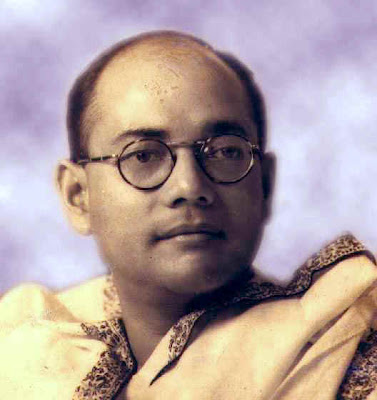
In January Subhash Chandra was prisoned for one year, and again in 1931. From January 1932 to March 1933 he was in detention without trial. He became ill and went to Vienna. In 1934 he wrote 'The Indian Struggle'. He arrived Mumbai in April 1936, from Vienna, and was arrested further.
Despite of all opposition from the Rightists, Subhash Chandra was elected Congress President in 1938, and re-elected in 1939 by defeating Gandhi's own nominee. When in his Presidential address at Haripura in 1938 he had drawn the outline for developing an Independent India of the future through a completely socio-economic planning, then in his address at Tripura Session in 1939 made the historic proposal that the Congress should give an ultimatum to the British Government demanding independence within six months and should simultaneously prepare for the final battle for freedom. But his proposal was bitterly opposed by the Rightists who were inclined to take the path of collaboration with the ruling power. He was curbed with all his powers, was imposed by so many terms and conditions that his positional authority became collapsed. It was the period when confrontation between Subhash Chandra and Gandhi rose to the highest level, and in consequence, Subhash Chandra resigned from Congress Presidentship on 29 April 1939. But he continued his own course of action. In retaliation, Bengal Provincial Congress Committee headed by him was suspended by the Congress High-command, and he was expelled from the party. But his approach, his arguments, and mass support towards his stand remained unabated.
Subhash Chandra announced the Formation of Forward Bloc at a public meeting in Calcutta on 3 May 1939. And then it became imminent to constitute Forward Bloc with a definite process, and on 22 June 1939 First All India Session of Forward Bloc held in Mumbai.
The prime contradiction between two powers, Subhash and Gandhites, between Leftists and the Rightists, at that time, was basically a contradiction between compromise and anti-compromise, between constitutionalism and revolutionary means. And thus, Subhash Chandra Bose, his image, became the symbol of revolutionary leftism in India. In March 1940 there was held a Congress Session at Ramgarh of Bihar. Subhash Chandra, on the same date and venue convened a parallel anti-compromise conference, which challenged Congress leadership about their sincerity towards the people of the country and their integrity for achieving unconditional independence, The conference completely washed away the Congress Session. Subhash Chandra, through this Anti-compromise Conference, practically, tied the workers and peasants of the country with one single equation and made a platform to combat the right-wing and reactionery forces. To consolidate the countrywide movement through a party discipline the First All India Conference of All India Forward Bloc was held in Nagpur, from 18 to 22 June, 1940, under his Presidentship. Here Forward Bloc was declared as a Socialist party.






No comments:
Post a Comment